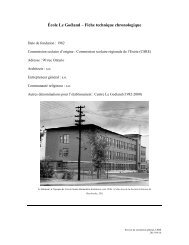Regroupements hétérogène et homogène - Commission scolaire de ...
Regroupements hétérogène et homogène - Commission scolaire de ...
Regroupements hétérogène et homogène - Commission scolaire de ...
Create successful ePaper yourself
Turn your PDF publications into a flip-book with our unique Google optimized e-Paper software.
RÉFÉRENCES BIBLIOGRAPHIQUES<br />
Ansalone, G. <strong>et</strong> Ming, C. (2006). Programming stu<strong>de</strong>nts for aca<strong>de</strong>mic success: The PLS<br />
an alternative to traditional tracking. Educational Research Quarterly, 29(3), 3-10.<br />
Ayalon, H. (2006). Nonhierarchical curriculum differentiation and inequality in<br />
achievement: A different story or more the same? Teachers College Record, 108,<br />
1186-1213.<br />
Berends, M. (1995). Educational stratification and stu<strong>de</strong>nt’s social bonding to school.<br />
British Journal of Sociology of Education, 16(3), 327-351.<br />
B<strong>et</strong>ts, J.R. <strong>et</strong> Shkolnik, J.L. (2000). The effects of ability grouping on stu<strong>de</strong>nt<br />
achievement and resource allocation in secondary schools. Economics of Education<br />
Review, 19, 1-15.<br />
Blanksby, D.C. (1999). Not quite eureka: Perceptions of a trial of cluster grouping as a<br />
mo<strong>de</strong>l for addressing the diverse range of stu<strong>de</strong>nt abilities at a junior secondary<br />
school. Educational Studies, 25(1), 79-88.<br />
Boaler, J., Wiliam, D. <strong>et</strong> Brown, M. (2000). Stu<strong>de</strong>nts’ experiences of ability grouping –<br />
Disaffection, polarisation and the construction of failure. British Educational<br />
Research Journal, 26(5), 631-648.<br />
Bouffard, T. <strong>et</strong> Couture N. (2003) Motivational Profile and Aca<strong>de</strong>mic Achievement<br />
Among Stu<strong>de</strong>nts Enrolled in Different Schooling Tracks. Educational Studies,<br />
29(1), 19-38.<br />
Burris, C.C., Heubert, J.P., Levin, H.M. (2006). Accelerating mathematics achievement<br />
using h<strong>et</strong>erogeneous grouping. American Educational Research Journal, 43(1),<br />
105-136.<br />
Carbonaro, W. (2005). Tracking, stu<strong>de</strong>nt’s effort, and aca<strong>de</strong>mic achievement. Sociology<br />
of Education, 78(1), 27-48.<br />
Catsambis, S., Mulkay, L., Crain, R. (2001). For b<strong>et</strong>ter or for worst? A nationwi<strong>de</strong> study<br />
of the psychological effects of gen<strong>de</strong>r and ability grouping in mathematics. Social<br />
Psychology of Education, 5, 83-115.<br />
Clark, C., Dyson, A. <strong>et</strong> Millward, A. (1999). Theories of inclusion, theories of schools:<br />
<strong>de</strong>construction and reconstruction the “inclusive school”. British Educational<br />
Research Journal, 25(2), 157-177.<br />
Ellison, B.J. <strong>et</strong> Hallinan, M.T. (2004). Ability Grouping in Catholic and Public Schools.<br />
Catholic Education: A Journal of Inquiry and Practice, 8(1), 107-129.<br />
Fortin <strong>et</strong> al. (2011) Chaire <strong>de</strong> recherche <strong>de</strong> la CSRS sur la réussite <strong>et</strong> la persévérance <strong>scolaire</strong>








